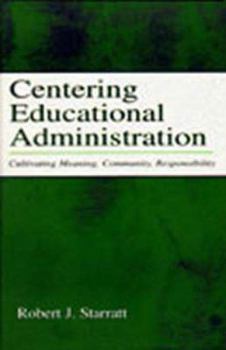Centering Educational Administration: Cultivating Meaning, Community, Responsibility
In this book, Starratt enters the national conversation among educational administration scholars and practitioners about what constitutes the core of their knowledge and practice. In Part I, he develops three main themes--cultivating meaning, community, and moral responsibility--which he then positions against national themes about the core of educational administration: school improvement, democratic community, and social justice. Rather than focusing on the routine managerial tasks normally associated with school administration (budgeting, personnel and legal problems, time and resource management, etc.), this text asks aspiring school leaders to reflect first on the underlying philosophical and sociological perspectives that constitute the substance of administrative work in education. Centering Educational Administration provides:
*A Unique Perspective on Leadership--The author views leadership as organically related to teaching and learning, as concerned with internal capacity building in response to state-imposed accountability pressures, and as an existential process of writing one's autobiography through their day-to-day work.





